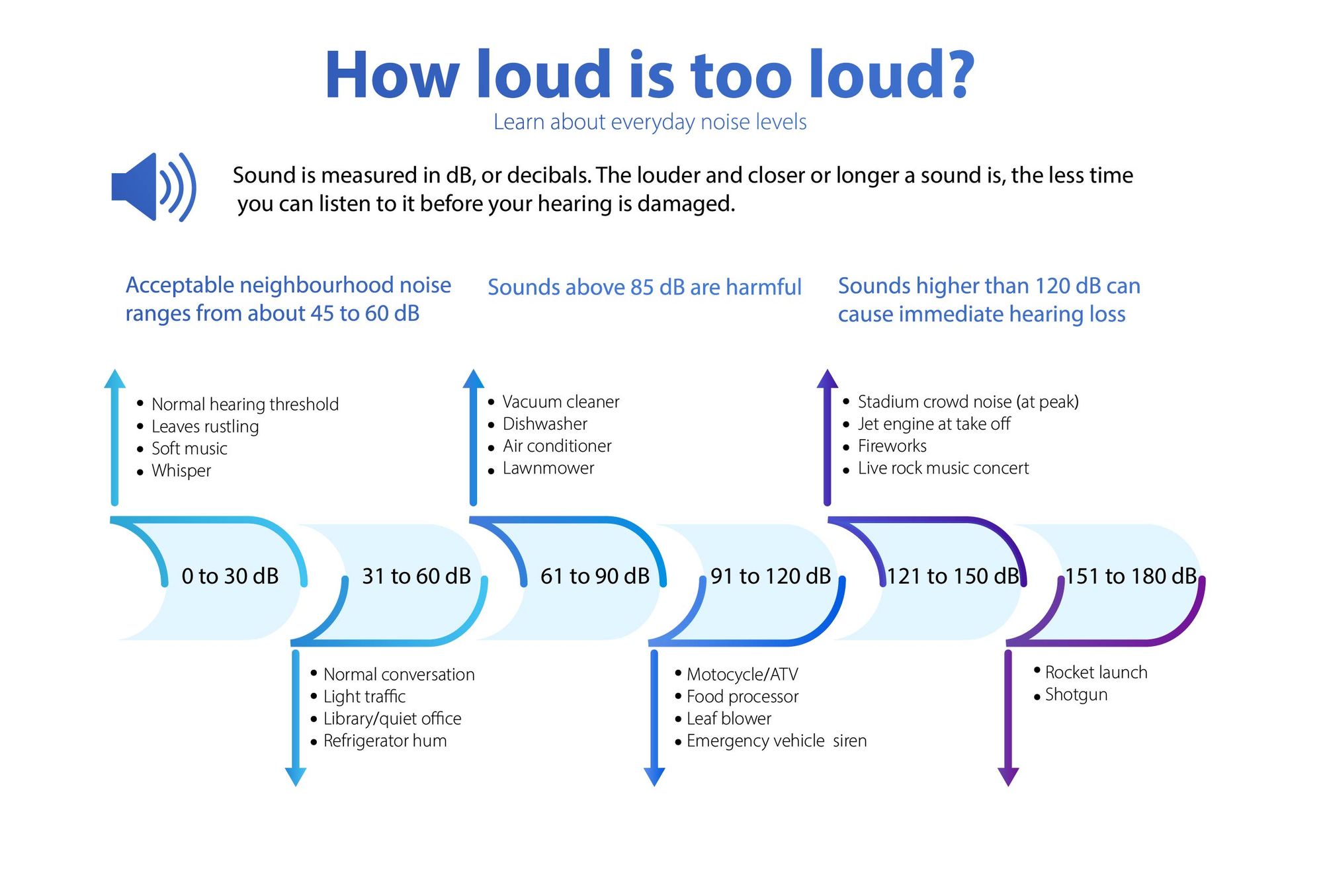- Permitted Noise Levels And Hours
- How To Deal With Noisy Neighbors
2.1 Talk To Them
2.2 Suggest A Plan And/or Compromise
2.3 Give Your Neighbors A Warning
2.4 Talk To Your Landlord, Management Company, Or HOA - Noisy Neighbors Soundproofing Hacks
3.1 Plug Up Leaky Doors
3.2 Expand Your Home Library
3.3 Add A Rug - How To Report Noisy Neighbors To Police
4.1 Document The Offenses
4.2 File A Noise Complaint - Is Suing a Neighbor for Noise a Good Idea?
- Measure Noise Level In You House With Decibel Pro App
Most of the world’s population now lives in cities and many of our homes are part of larger communities rather than secluded. This comes with both upsides and downsides.
One such downside leaves many of us wondering how to deal with loud neighbors. Whether it’s loud music, banging, or yelling, neighbors can become disturbing.
Loud noises from upstairs or downstairs neighbors can become a nuisance fast. Especially when you’re working from home or you’re trying to get some well-earned rest.
On the other hand, long-term exposure to loud noises can escalate from a mere disturbance to a serious health hazard. That’s why it’s important to know how and when to protect yourself.
In this article, we’re going to look into several solutions that can solve your noisy neighbor problem. And help you stay safe.
Permitted Noise Levels and Hours
It is generally accepted that noise levels exceeding 85 dB are harmful to human hearing and are therefore restricted to industrial areas. Additional measures and rules also apply to these areas to keep workers safe.
For residential areas, exposure to noise levels over 70 dB is considered disturbing. Prolonged exposure is also considered potentially harmful to human hearing.
Permitted noise levels and hours vary depending on how your area is categorized and the type of housing you live in (apartment building, a duplex, individual home). Based on these details, you will know what the limits are and how to better deal with loud neighbors.
Most cities around the world have noise regulations for residential areas.
Noise limits will depend on:
- The area where you live
- The time of day the noise occurs
- Whether the noise is coming from inside or outside
- What is causing the noise
- How often the noise occurs
In the US, the following limits generally apply:
• Exterior noise: 55 dBA (between 7 a.m. – 10 p.m.) and 50 Dba (between 10 p.m. – 7 a.m.)
• Interior noise: 55 dBA (between 7 a.m. – 10 p.m.) and 45 Dba (between 10 p.m. – 7 a.m.)
In many cases, local authorities supplement nation-wide recommendations or laws with local bylaws or regulations. You will have to check in with your local authorities to see exactly what noise level limits and what violation consequences specifically apply to your area.
How to Deal with Noisy Neighbors
We all want to enjoy peace and quiet in our homes. However, the noise caused by others can sometimes make that hard. Be it that they vacuum at all the wrong hours or that they stomp and drop things on their hardwood floor, every city dweller has wondered at least once how to deal with noisy neighbors.
Here are some general noise level guidelines to help you assess your situation:

The general rule is that if your noisy neighbor problem is unreasonably preventing you from quietly enjoying your home, the law is on your side. Still, if you don’t want to take that course of action directly, you could try a few alternatives.
Talk to Them
While dealing with noisy neighbors can be frustrating, many times the solution may be easier than you think.
The first thing you can try is to have a civil discussion with your neighbor. Tell them how the noise coming from their home is affecting you.
You may even find that they are unaware they are causing this disturbance.
Some people genuinely do not realize that having the TV on so loud or letting their children play on the hardwood floors is affecting someone else’s wellbeing. Similarly, a teenager may not realize that playing their favorite music at maximum volume is not as pleasant for everyone.
Try to stay calm and respectful while talking to your neighbor to keep things from escalating.
Suggest a Plan and/or a Compromise
If you are finding common ground with your noisy neighbors, discuss about setting up a plan. A compromise that will make living in the same community easier for both of you.

It could be that there is one specific noise bothering you that they could stop. For instance, if they are playing loud music late at night. Or a particular time of day when you need them to be quieter. For instance, if you have a small baby that needs a strict sleep schedule.
Explain how their noise is affecting your ability to study, sleep, concentrate, or enjoy your home.
Describe the specifics of your situation, ask them to give their view on it, and try to work out a mutually beneficial deal. To make things official, you could even consider signing a written agreement.
Give Your Neighbors a Warning
If your loud neighbor is less than open to finding a solution, you could try giving them a warning. Tell them that if the situation is not resolved, you will contact authorities or reserve the right to file legal action against them.
Provide evidence of the noise levels and a log of all the times they’ve disturbed your peace. This will show them that you have enough to document a formal complaint.
You could point out to them that they are in violation of local laws or regulations. If so, provide them a copy of these laws and highlight the consequences.
Talk to Your Landlord, Management Company or HOA
If all your tactics for dealing with your noisy neighbor have failed, talk to your landlord, management company or HOA. They will be able to discuss with your neighbor in their official capacities.
Your landlord in particular has the obligation to take reasonable steps to protect your rights.
Describe and document your noise complaint. Attach noise level evidence and time logs. Explain that you’ve tried to settle things with your neighbor directly and what you expect as a solution.

Your landlord, management company or HOA will most likely carry out their own investigation and provide you with an official answer.
For your noisy neighbor, the consequences vary depending on the applicable rules. Normally, they may be given a warning or a fine. In very serious cases, your loud neighbor may even end up paying you compensation.
Check what rules and regulations apply to your specific location and situation to evaluate possible courses of action.
Noisy Neighbor Soundproofing Hacks
Soundproofing your space may sometimes be easier than dealing with your noisy neighbors.
To enjoy some peace and quiet, you first need to determine where the noise is coming from. Then, you need to find solutions for either blocking the sound or absorbing it.
Here are a few soundproofing tips and tricks you can try:
Plug Up Leaky Doors
One of the first steps you can try is installing doors and windows with better soundproofing qualities. Alternatively, you can improve the quality of the ones you have.
To do this, seal any cracks in the doors/windows or their frames and draught proof the seals. You can use weatherstrips or foam tape for this.
Ensure that as little air as possible is passing through.
Expand Your Home Library
Another efficient solution is finding ways to absorb the loud noise.

To do this, you can try adding wall bookshelves on the wall dividing your living space and your neighbors. Unfortunately, this solution is not so efficient if the noisy neighbor is located upstairs or downstairs.
Add a Rug
Rugs also have the potential to absorb noise.
You can put them on the floor and also hang them on the wall for additional soundproofing.
How to Report Noisy Neighbors to the Police
You may get to a point where you’ll be so frustrated with your neighbor’s loud noises that you will consider calling the authorities.
You can call the police on your noisy neighbors if the issue is getting out of hand or if talking to them and trying to solve the problem amicably has failed.
Document the Offences
To document your complaint, gather and keep evidence of the noise levels. For this, you can use a sound meter or a phone app like Decibel Pro.
Also keep a log of the dates and times your neighbor has caused disturbances and how. If you can, also add witness statements.
File a Noise Complaint
To make things official, you will need to submit a formal complaint against your noisy neighbor. You will also need to provide the related evidence and your identification and contact information. However, your identity can be held confidential if you want it to.
Is Suing a Neighbor for Noise a Good Idea?
Your last resort when you are wondering how to deal with loud neighbors may be legal action. This solution usually applies to situations that cannot be resolved in an amicable manner.
If you are considering this option, you should take into account that it may be a lengthy and costly process. You will need to take time out of your schedule to appear before court and provide unquestionable evidence of the disturbance or its effects.
However, if you sue your neighbor for noise and win, you may be entitled to compensation and the court will force the neighbor to stop the nuisance immediately.
Measure Noise Levels in Your Home with the Decibel Pro App
In any case when you may be exposed to loud noise, you should use a sound level meter or a sound level meter app to check sound levels. This will keep you safe from dangerous noise and potential hearing damage.
Decibel Pro is an app that can help you measure noise levels inside and outside your home and document your noise complaints. It is very easy to use and provides accurate readings that you can use as evidence against a noisy neighbor.
Learn more about protection from loud noises here.



